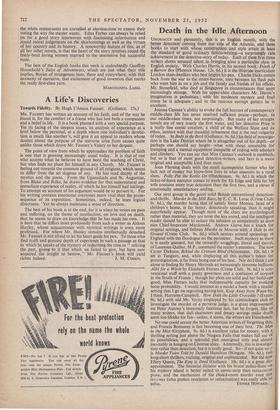A Life's Discoveries •
Towards Fidelity. By Hugh I'Anson Fausset. (Gollancz. 15s.)
MR. FAUSSET has written an account of his faith, and of the way he found it, for the comfort of a friend who has lost both a companion and a belief in life. It is a book planned with a very special purpose. Yet its facing of the deepest issues, its analysis of experience at a level below the personal, at a depth where one individual's derelic- tion is much like another's, will give it an appeal to readers whose doubts about the purpose of the universe arise from causes quite unlike those which drove Mr. Fausset's Valery to her despair.
The point of view from which he approaches the problem of faith is one that is growing increasingly usual today. It is that of one who accepts what he believes to have been the teaching of Christ, but who finds no place for himself in any Church. Mr. Fausset is feeling out towards the common ground of all religions, which seems to differ from the set dogmas of any. He has read deeply of the mystics and the poets. From the Upanishads and St. Augustine, from Blake and Rilke, he draws evidence for that supernatural and immediate experience of reality, of which he has himself had inklings. To attempt an account of his argument would be to pervert it. For his writing contains emotional overtones more vital than the prose- sequence of its exposition. Sometimes, indeed, he loses logical directness. "Yet he always maintains a sense of direction.
The best of his book is at the end, for it is when he writes on pain and suffering, on the theme of recollection, on love and on death, that he seems to draw on knowledge that he has made his own. It is here that he differs most profoundly from such a writer as Aldous Huxley, whose acquaintance with mystical writings is even more profound. For where Mr. Huxley remains intellectually detached Mr. Fatisset is not afraid to let his heart guide his pen. To those who find truth and genuine depth of experience in such a passage as that in which he speaks of the mystery of redeeming the time or" reliving the past, giving to it that which we failed to give, but have now acquired the insight to bestow," Mr. Fausset's book will yield










































































 Previous page
Previous page